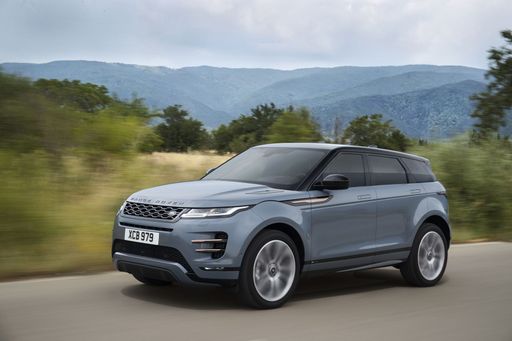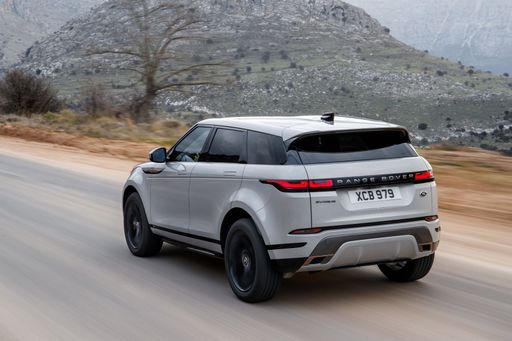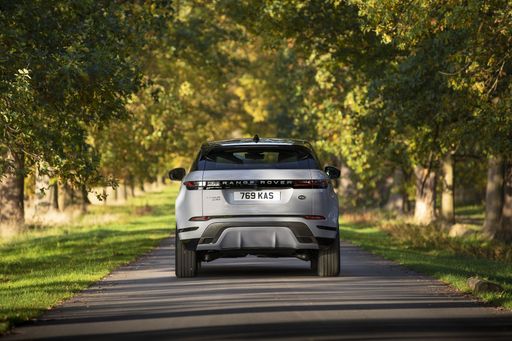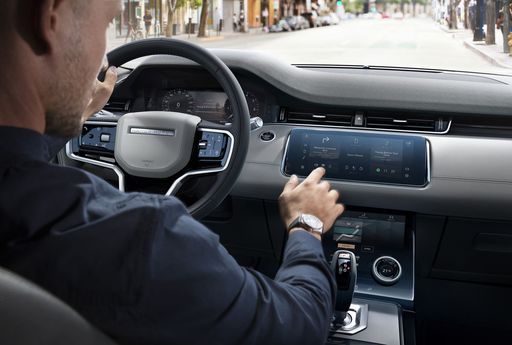VW Tiguan vs Land Rover Range Rover Evoque - Differences and prices compared
Compare performance (272 HP vs 269 HP), boot space and price (33300 £ vs 43300 £ ) at a glance. Find out which car is the better choice for you – VW Tiguan or Land Rover Range Rover Evoque?
Costs and Efficiency:
Price and efficiency are key factors when choosing a car – and this is often where the real differences emerge.
VW Tiguan has a noticeable advantage in terms of price – it starts at 33300 £ , while the Land Rover Range Rover Evoque costs 43300 £ . That’s a price difference of around 9985 £.
Fuel consumption also shows a difference: VW Tiguan manages with 1.40 L and is therefore decisively more efficient than the Land Rover Range Rover Evoque with 3.70 L. The difference is about 2.30 L per 100 km.
As for electric range, the VW Tiguan performs clearly better – achieving up to 126 km, about 66 km more than the Land Rover Range Rover Evoque.
Engine and Performance:
Power, torque and acceleration say a lot about how a car feels on the road. This is where you see which model delivers more driving dynamics.
When it comes to engine power, the VW Tiguan has a barely noticeable edge – offering 272 HP compared to 269 HP. That’s roughly 3 HP more horsepower.
In acceleration from 0 to 100 km/h, the VW Tiguan is noticeable quicker – completing the sprint in 5.90 s, while the Land Rover Range Rover Evoque takes 7.20 s. That’s about 1.30 s faster.
In terms of top speed, the VW Tiguan performs somewhat better – reaching 242 km/h, while the Land Rover Range Rover Evoque tops out at 213 km/h. The difference is around 29 km/h.
There’s also a difference in torque: Land Rover Range Rover Evoque pulls clearly perceptible stronger with 540 Nm compared to 400 Nm. That’s about 140 Nm difference.
Space and Everyday Use:
Whether family car or daily driver – which one offers more room, flexibility and comfort?
Both vehicles offer seating for 5 people.
In curb weight, VW Tiguan is slightly lighter – 1599 kg compared to 1792 kg. The difference is around 193 kg.
In terms of boot space, the VW Tiguan offers noticeable more room – 652 L compared to 472 L. That’s a difference of about 180 L.
In maximum load capacity, the VW Tiguan performs distinct better – up to 1650 L, which is about 494 L more than the Land Rover Range Rover Evoque.
When it comes to payload, Land Rover Range Rover Evoque a bit takes the win – 600 kg compared to 533 kg. That’s a difference of about 67 kg.
Who comes out on top?
Overall, the VW Tiguan shows itself to be wins the duel decisively and secures the title of DriveDuel Champion.
It convinces with the more balanced overall package and proves to be the more versatile choice for everyday use.

VW Tiguan
Costs and Consumption
View detailed analysis
Engine and Performance
View detailed analysis
Dimensions and Body
View detailed analysis
VW Tiguan
The VW Tiguan blends sensible family practicality with a dash of German polish, delivering a calm, reassuring ride and a cabin that never feels like an afterthought. For buyers who want an SUV that’s easy to live with yet still nicely dressed, the Tiguan is the grown‑up choice that keeps a cheeky wink in reserve.
details





Land Rover Range Rover Evoque
The Range Rover Evoque turns heads with a compact, sculpted silhouette and an interior that feels more boutique hotel than utility vehicle. It delivers composed, playful handling around town while keeping enough ruggedness for weekend escapes — perfect for buyers who want luxury without the ostentation.
details



Costs and Consumption |
|
|---|---|
|
Price
33300 - 51900 £
|
Price
43300 - 64800 £
|
|
Consumption L/100km
1.4 - 8.4 L
|
Consumption L/100km
3.7 - 7.8 L
|
|
Consumption kWh/100km
-
|
Consumption kWh/100km
-
|
|
Electric Range
118 - 126 km
|
Electric Range
60 km
|
|
Battery Capacity
19.70 kWh
|
Battery Capacity
11.50 kWh
|
|
co2
32 - 190 g/km
|
co2
85 - 177 g/km
|
|
Fuel tank capacity
45 - 58 L
|
Fuel tank capacity
57 - 67 L
|
Dimensions and Body |
|
|---|---|
|
Body Type
SUV
|
Body Type
SUV
|
|
Seats
5
|
Seats
5
|
|
Doors
5
|
Doors
5
|
|
Curb weight
1599 - 1890 kg
|
Curb weight
1792 - 2157 kg
|
|
Trunk capacity
490 - 652 L
|
Trunk capacity
472 L
|
|
Length
4539 mm
|
Length
4371 mm
|
|
Width
1842 - 1859 mm
|
Width
1900 mm
|
|
Height
1656 - 1658 mm
|
Height
1649 mm
|
|
Max trunk capacity
1486 - 1650 L
|
Max trunk capacity
1156 L
|
|
Payload
460 - 533 kg
|
Payload
503 - 600 kg
|
Engine and Performance |
|
|---|---|
|
Engine Type
Petrol, Petrol MHEV, Diesel, Plugin Hybrid
|
Engine Type
Petrol MHEV, Diesel MHEV, Plugin Hybrid
|
|
Transmission
Automatic
|
Transmission
Manuel, Automatic
|
|
Transmission Detail
Dual-Clutch Automatic
|
Transmission Detail
Manual Gearbox, Automatic Gearbox
|
|
Drive Type
All-Wheel Drive, Front-Wheel Drive
|
Drive Type
Front-Wheel Drive, All-Wheel Drive
|
|
Power HP
130 - 272 HP
|
Power HP
160 - 269 HP
|
|
Acceleration 0-100km/h
5.9 - 10.6 s
|
Acceleration 0-100km/h
7.2 - 10.3 s
|
|
Max Speed
210 - 242 km/h
|
Max Speed
190 - 213 km/h
|
|
Torque
220 - 400 Nm
|
Torque
260 - 540 Nm
|
|
Number of Cylinders
4
|
Number of Cylinders
3 - 4
|
|
Power kW
96 - 200 kW
|
Power kW
118 - 198 kW
|
|
Engine capacity
1498 - 1984 cm3
|
Engine capacity
1498 - 1998 cm3
|
General |
|
|---|---|
|
Model Year
2024 - 2025
|
Model Year
2025
|
|
CO2 Efficiency Class
G, D, E, F, B
|
CO2 Efficiency Class
G, F, B
|
|
Brand
VW
|
Brand
Land Rover
|
What drivetrain options does the VW Tiguan have?
The VW Tiguan is offered with All-Wheel Drive or Front-Wheel Drive.




